-
ORIGINAL ARTICLE03-06-2023
Construct elaboration and validity of the Pregnancy Depression Risk Scale
Revista Brasileira de Enfermagem. 2023;76(2):e20220306
Abstract
ORIGINAL ARTICLEConstruct elaboration and validity of the Pregnancy Depression Risk Scale
Revista Brasileira de Enfermagem. 2023;76(2):e20220306
DOI 10.1590/0034-7167-2022-0306
Views0See moreABSTRACT
Objectives:
to elaborate and analyze the Pregnancy Depression Risk Scale psychometric properties.
Methods:
methodological research, in six steps: theoretical model empirical definition; elaboration of scale items with literature review; consultation with five professional health experts and 15 pregnant women; content validity with six experts; pre-test-semantic validity with 24 pregnant women; scale factor structure definition with 350 pregnant women; pilot study with 100 pregnant women, totaling 489 pregnant women and 11 experts. Data were analyzed by content analysis, exploratory factor analysis, multitrait-multimethod analysis and internal consistency.
Results:
sixty-eight risk factors were identified for item formulation. The final version of the scale consisted of 24 items in five domains. The scale demonstrated satisfactory construct content, semantic, validity and reliability.
Conclusions:
the scale proved to be valid in terms of content and semantics, with a factor structure defined according to the adopted theoretical model and satisfactory psychometric properties.
-
ORIGINAL ARTICLE03-06-2023
Medication reconciliation in pediatrics: a validation of instruments to prevent medication errors
Revista Brasileira de Enfermagem. 2023;76(2):e20210755
Abstract
ORIGINAL ARTICLEMedication reconciliation in pediatrics: a validation of instruments to prevent medication errors
Revista Brasileira de Enfermagem. 2023;76(2):e20210755
DOI 10.1590/0034-7167-2021-0755
Views0See moreABSTRACT
Objectives:
to develop and validate the content of two instruments for promoting medication reconciliation for the transition of care of hospitalized children.
Methods:
methodological study, conducted in five stages: scope review for conceptual structure; elaboration of the initial version; content validation with five specialists using the Delphi technique; reassessment; and construction of the final version of the instruments. A content validity index of at least 0.80 was adopted.
Results:
three rounds of evaluation were carried out to reach the validity index of the proposed contents, whereas a new analysis of 50% of the 20 items of the instrument aimed at families, and 28.5% of the 21 items aimed at professionals was necessary. The instrument aimed at families reached an index of 0.93, and the instrument for professionals, 0.90.
Conclusions:
the proposed instruments were validated. It is now possible to proceed with practical implementation studies to identify their influence on safety during medication reconciliation at transition of care.

-
REVIEW03-06-2023
Nursing protocols to reduce urinary tract infection caused by indwelling catheters: an integrative review
Revista Brasileira de Enfermagem. 2023;76(2):e20220067
Abstract
REVIEWNursing protocols to reduce urinary tract infection caused by indwelling catheters: an integrative review
Revista Brasileira de Enfermagem. 2023;76(2):e20220067
DOI 10.1590/0034-7167-2022-0067
Views0See moreABSTRACT
Objectives:
to analyze the production of knowledge in research articles about the effectiveness of nursing protocols for reducing indwelling urinary catheter dwell time and catheter-associated urinary tract infection rate in hospitalized adult and older patients.
Methods:
an integrative review of three full articles, available in the MEDLINE Complete – EBSCO, Scopus and Web of Science databases, from 01/01/2015 to 04/26/2021.
Results:
the three protocols reduced infection rates, and from the review/synthesis of their knowledge, a level IV body of evidence emerged to compose the nursing care process aimed at reducing indwelling urinary catheter dwell time and catheter-associated urinary tract infection.
Final Considerations:
this process gathers scientific evidence to support the elaboration of nursing protocols and, consequently, the conduction of clinical trials on its effectiveness in reducing urinary tract infection by indwelling urinary catheter.

-
ORIGINAL ARTICLE03-06-2023
Organizational politics and professional struggles in nursing
Revista Brasileira de Enfermagem. 2023;76(1):e20220180
Abstract
ORIGINAL ARTICLEOrganizational politics and professional struggles in nursing
Revista Brasileira de Enfermagem. 2023;76(1):e20220180
DOI 10.1590/0034-7167-2022-0180
Views0See moreABSTRACT
Objective:
to analyze the professional struggles between nursing organizational entities, in Rio de Janeiro, during the Regional Nursing Council’s electoral process (1990-1993 administration).
Method:
historical study. We used journalistic articles, normative documents, legislation and semi-structured interviews with five nursing professionals who participated in this process. Interpretation of findings was supported by Bourdieu’s concepts of habitus, field, capital, and symbolic power.
Results:
Electoral Code changes of the aforementioned council, under the influence of administration (1987-1990), candidate for re-election, influenced the disclosure and eligibility criteria, making it difficult for broad participation, especially of Associação Brasileira de Enfermagem Rio de Janeiro Section.
Final considerations:
nursing, in this period, generated a field of disputes related to positions of power and gender, which was evidenced in the electoral process studied, which highlighted using limiting strategies by a group, making it difficult for the entire category to participate.
-
ORIGINAL ARTICLE03-06-2023
The pandemic changes daily life and ways of living: technosociality and user/families experiences
Revista Brasileira de Enfermagem. 2023;76:e20220177
Abstract
ORIGINAL ARTICLEThe pandemic changes daily life and ways of living: technosociality and user/families experiences
Revista Brasileira de Enfermagem. 2023;76:e20220177
DOI 10.1590/0034-7167-2022-0177
Views0See moreABSTRACT
Objectives:
understand the changes imposed by the COVID-19 pandemic in the daily lives of users of Primary Health Care and their families and its impact on self-care and health promotion.
Methods:
this is a holistic-qualitative multiple case study, based on the Comprehensive Sociology of Everyday Life, in which 61 users participated.
Results:
experiencing a new daily life in COVID-19 pandemic times, users express their feelings, adaptation to new habits and ways of living. Health technologies and virtual social networks stand out in helping with everyday tasks, in communicating with loved ones and health professionals, and in validating dubious information. Faith and spirituality arise in the face of uncertainty and suffering.
Final Considerations:
it is imperative to pay close attention to the changes in daily life caused by the COVID-19 pandemic, in order to offer care directed to the singular and collective needs.

-
ORIGINAL ARTICLE03-06-2023
The self-care process of community-dwelling older adults during the COVID-19 pandemic
Revista Brasileira de Enfermagem. 2023;76:e20220644
Abstract
ORIGINAL ARTICLEThe self-care process of community-dwelling older adults during the COVID-19 pandemic
Revista Brasileira de Enfermagem. 2023;76:e20220644
DOI 10.1590/0034-7167-2022-0644
Views0See moreABSTRACT
Objectives:
to understand the self-care process of community-dwelling older adults during the COVID-19 pandemic.
Methods:
this is an explanatory study with a qualitative approach based on the constructivist Grounded Theory, carried out with 18 community-dwelling older adults. Data collection took place through interviews and content was analyzed through initial and focused coding.
Results:
two categories were obtained: “Building connections to support self-care practices” and “Living with the risk group stigma”. From their interaction, the phenomenon “Performing self-care in old age during the COVID-19 pandemic” emerged.
Final Considerations:
it was possible to identify how older adults’ experiences curing the COVID-19 pandemic had repercussions on their self-care process, being influenced by factors such as information about the disease and the impacts of risk group stigmas.
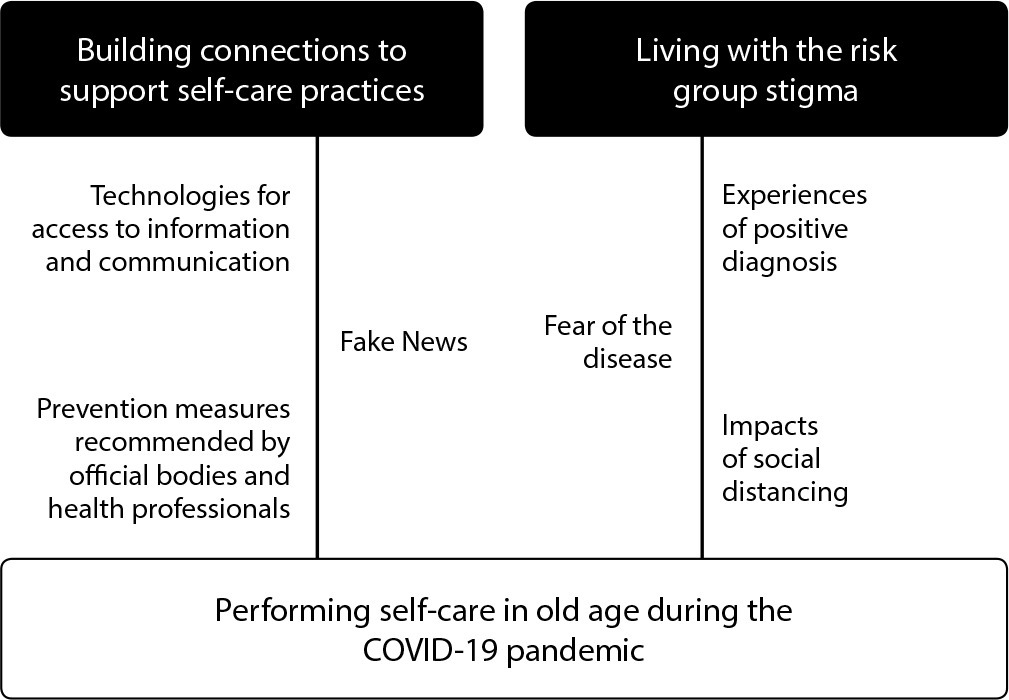
-
03-06-2023
Palliative care strategies in the management of people with serious cases of COVID-19
Revista Brasileira de Enfermagem. 2023;76:e20220308
Abstract
Palliative care strategies in the management of people with serious cases of COVID-19
Revista Brasileira de Enfermagem. 2023;76:e20220308
DOI 10.1590/0034-7167-2022-0308
Views0See moreABSTRACT
Objectives:
to analyze the assistance strategies in palliative care developed in the COVID-19 pandemic for critically ill patients and their families.
Methods:
an integrative review carried out in August 2021 and updated in April 2022 in the Base de Dados de Enfermagem (BDENF), Cumulative Index to Nursing and Allied Health Literature (CINAHL), Medical Literature Analysis and Retrieval System Online (MEDLINE), US National Library of Medicine (PubMed), Web of Science databases, and presented in the PRISMA flowchart.
Results:
thirteen works were selected for reading and content analysis, from which emerged the two main themes that reflect the reality evidenced in this context: The sudden advent of COVID-19 with impacts on palliative care; and The strategies used in palliative care to mitigate these impacts.
Final Considerations:
palliative care is the best strategy for providing health care, used as a comfort to bring relief and comfort to patients and families.

-
02-06-2023
The challenge of university teaching in times of the COVID-19 pandemic
Revista Brasileira de Enfermagem. 2023;76(2):e760201
Abstract
The challenge of university teaching in times of the COVID-19 pandemic
Revista Brasileira de Enfermagem. 2023;76(2):e760201
DOI 10.1590/0034-7167.2023760201
Views0This planet’s history has been a long and sometimes tortuous one. To date, a total of five disappearances of life on Earth have been distinguished: the great oxidation; the Ordovician-Silurian extinction; the Devonian extinction; the Permian-Triassic extinction; the Triassic-Jurassic extinction; and the Cretaceous-Tertiary extinction. The causes? Very varied and diverse: anoxia phenomena in the marine […]See more
-
REVIEW06-11-2021
Mental health interventions implemented in the COVID-19 pandemic: what is the evidence?
Revista Brasileira de Enfermagem. 2021;74:e20200635
Abstract
REVIEWMental health interventions implemented in the COVID-19 pandemic: what is the evidence?
Revista Brasileira de Enfermagem. 2021;74:e20200635
DOI 10.1590/0034-7167-2020-0635
Views0See moreABSTRACT
Objective:
to map the evidence on mental health interventions implemented during the COVID-19 pandemic.
Method:
this scoping review was carried out in the MEDLINE/PubMed, SCOPUS, Web of Science, PsycINFO, and Science Direct databases and in the medRxiv, bioRxiv, and PsyArXiv preprints servers using the descriptors “Covid-19”, “coronavirus infection”, “coronavirus”, “2019-nCoV”, “2019 novel coronavirus disease”, “SARS-CoV-2”, “health personnel”, “general public”, and “mental health”.
Results:
eight articles were selected and categorized into mental health interventions for the population, among which mental health interventions were for people diagnosed with suspicion/confirmed COVID-19 and mental health interventions for health professionals.
Conclusion:
telemonitoring, virtual games and strategies focused on social support and muscle relaxation techniques, characterized as non-pharmacological and low-cost, were shown as interventions, which, since they are effective, need to be encouraged and included in mental health care practices.

-
06-07-2019
Nursing performance in robotic surgeries: integrative review
Revista Brasileira de Enfermagem. 2019;72(3):795-800
Abstract
Nursing performance in robotic surgeries: integrative review
Revista Brasileira de Enfermagem. 2019;72(3):795-800
DOI 10.1590/0034-7167-2018-0426
Views0See moreABSTRACT
Objective:
To know the scientific production on the performance of the nursing staff in robotic surgeries, identifying the role of the nurse in the three perioperative periods.
Methods:
Integrative review, search in the databases National Library of Medicine, National Institutes of Health, Scientific Electronic Library Online and Biblioteca Virtual em Saúde, performed from June to September, 2017; 17 selected articles met the inclusion criteria.
Results:
Most articles were published in foreign journals in English, nine in the United States, classified with evidence level of 4 and 5. The role of nursing in the perioperative period was identified, related mainly to patient safety. The most mentioned perioperative period in the articles was the intraoperative, with greater concern in the positioning of the patient.
Conclusion:
The nursing performance and patient safety in robotic surgeries are similar to the ones in major surgeries, requiring from the patient a specific knowledge on the setting and preparation of the robot.
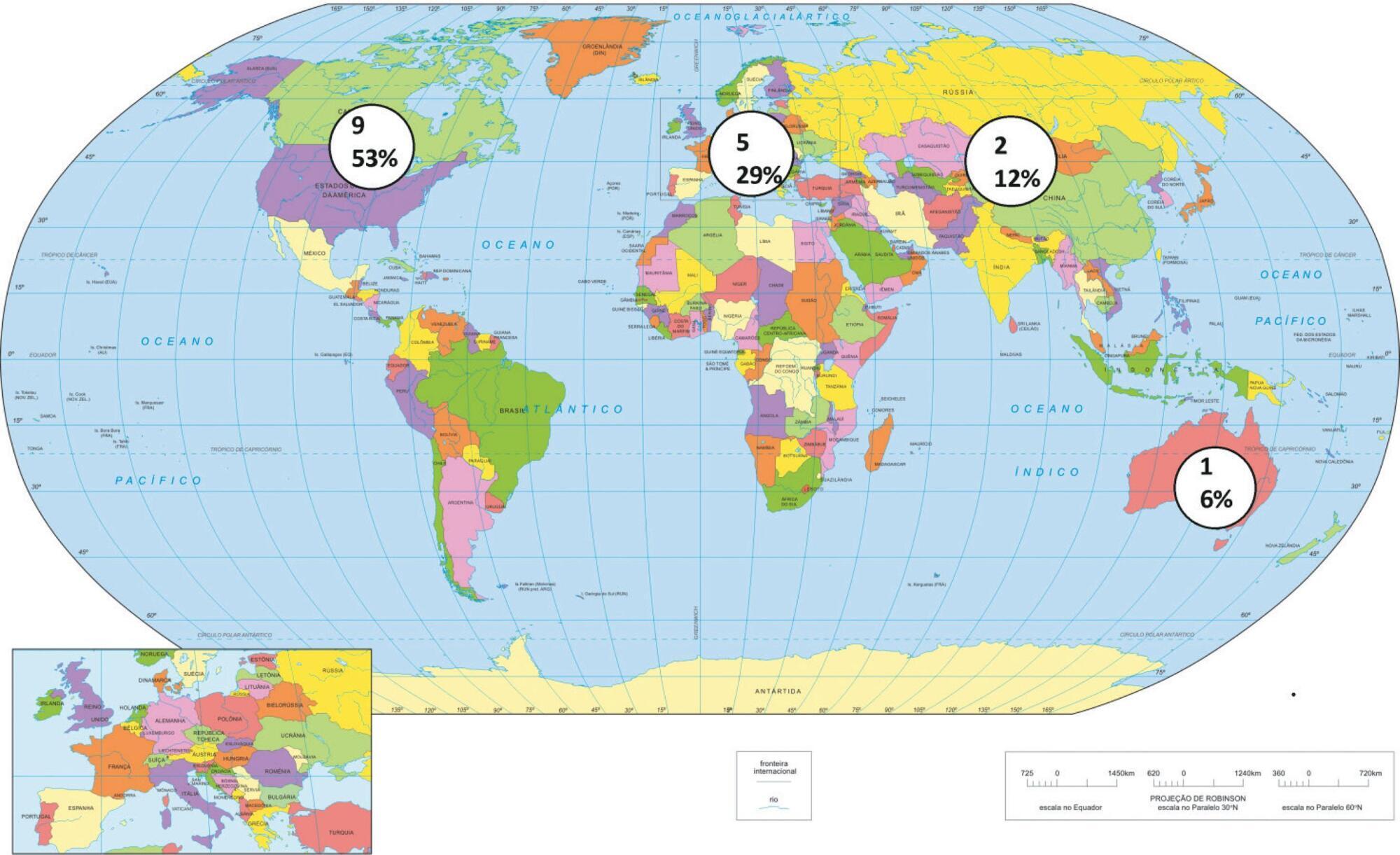
-
ORIGINAL ARTICLE10-21-2019
“Waiting for a miracle”: Spirituality/Religiosity in coping with sickle cell disease
Revista Brasileira de Enfermagem. 2019;72(6):1554-1561
Abstract
ORIGINAL ARTICLE“Waiting for a miracle”: Spirituality/Religiosity in coping with sickle cell disease
Revista Brasileira de Enfermagem. 2019;72(6):1554-1561
DOI 10.1590/0034-7167-2018-0635
Views0See moreABSTRACT
Objective:
To understand spirituality/religiosity as experienced by people with sickle cell disease, and its influence on coping with the disease.
Method:
A qualitative, descriptive, and exploratory study conducted in the State of Bahia. Twenty-nine respondents participated in semi-structured interviews. Content analysis was used to analyze the empirical material.
Results:
Individuals with sickle cell disease experience spirituality/religiosity motivated by their hope for a miracle, and fear of death; among their rites are: reading religious materials, individual and group prayer, and attendance at worship services. The effects on their health include: comfort by means of coping by comparing two evils, anxiety relief, social support, and lifestyle changes; however, spirituality/religiosity may be impaired.
Final considerations:
This study demonstrates the need to qualify health professionals to address spiritual issues of these individuals during illness, with the aims of diagnosing suffering and anguish, and providing care, comfort and strengthening of the spiritual bonds of these individuals.
-
ORIGINAL ARTICLE12-21-2020
Construction and validation of a mobile application for development of nursing history and diagnosis
Revista Brasileira de Enfermagem. 2020;73:e20190674
Abstract
ORIGINAL ARTICLEConstruction and validation of a mobile application for development of nursing history and diagnosis
Revista Brasileira de Enfermagem. 2020;73:e20190674
DOI 10.1590/0034-7167-2019-0674
Views0See moreABSTRACT
Objectives:
to describe the construction and validation process for a mobile application for development of the nursing history and diagnosis.
Methods:
methodological study conducted in 2018 in three stages: content creation, based on the Basic Human Needs categories and nursing diagnoses; content assessment by nine nursing judges, with calculation of the content validity index; and construction of the application, which included definition of the requirements, a conceptual map, implementation and prototyping options, tests and implementation.
Results:
the application was organized by sections: Grouped Basic Human Needs, Cranial pair tests, Clinical assessment scales and Additional tests. Two section were adjusted according to the judges’ suggestions.
Final Considerations:
it is the first application produced in Brazil based on the Basic Human Need categories, which enables quick access to information, concepts and typical nomenclatures of semiology, recording of clinical data and definition of nursing diagnoses.
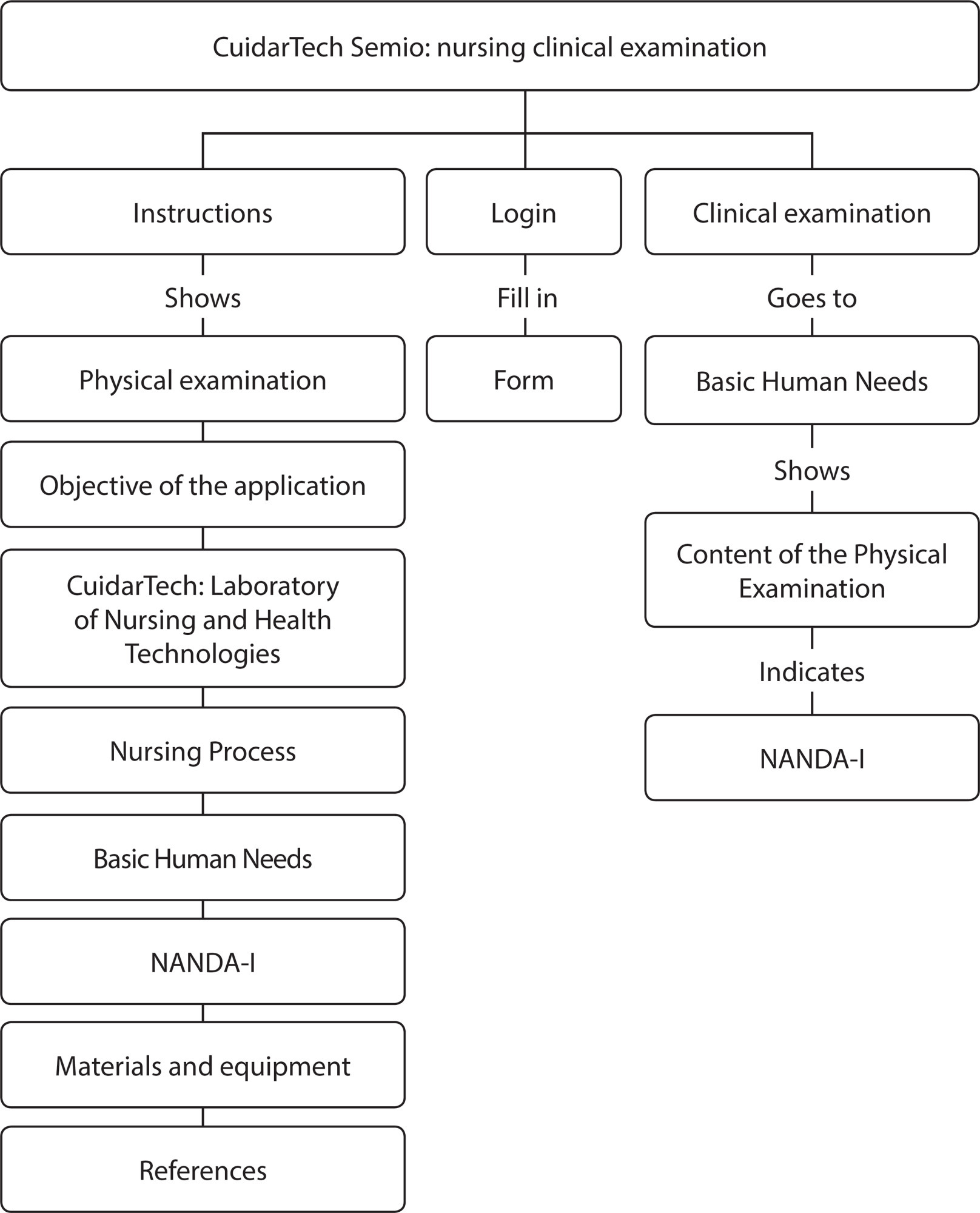
-
ORIGINAL ARTICLE10-01-2022
Factors associated with vulnerability and fragility in the elderly: a cross-sectional study
Revista Brasileira de Enfermagem. 2022;75(2):e20200399
Abstract
ORIGINAL ARTICLEFactors associated with vulnerability and fragility in the elderly: a cross-sectional study
Revista Brasileira de Enfermagem. 2022;75(2):e20200399
DOI 10.1590/0034-7167-2020-0399
Views0See moreABSTRACT
Objectives:
to assess factors associated with vulnerability and fragility in the elderly.
Methods:
crosssectional study with 384 elderly people in Fortaleza, Ceará. The Vulnerable Elders Survey and Clinical-Functional Vulnerability Index – 20 were used. Chi-square and Fisher’s exact tests were used for associations. In the analysis of the combined influence of risk factors, the stepwise logistic regression and multinomial regression methods were adopted.
Results:
251 (65.4%) non-vulnerable and 133 (34.6%) vulnerable elders. From the vulnerable elders analyzed, 42 (30.9%) are at high risk for frailty. Factors associated with vulnerability: age, gender, presence of comorbidities, hypertension, diabetes, osteoporosis and use of polypharmacy. There is a 30% increase in the chance of vulnerability for each additional drug. Physical activity reduces the chance of vulnerability by 60%. Factors associated with frailty: educational level; self-perception of health; comorbidities; polypharmacy.
Conclusions:
it is important to pay attention to the presence of arterial hypertension, osteoporosis, polypharmacy, and encourage the practice of physical activity.
-
ORIGINAL ARTICLE10-21-2019
Caring ability, burden, stress and coping of family caregivers of people in cancer treatment
Revista Brasileira de Enfermagem. 2019;72(6):1541-1546
Abstract
ORIGINAL ARTICLECaring ability, burden, stress and coping of family caregivers of people in cancer treatment
Revista Brasileira de Enfermagem. 2019;72(6):1541-1546
DOI 10.1590/0034-7167-2018-0605
Views0See moreABSTRACT
Objective:
To analyze the association between the caring ability and the burden, stress and coping of family caregivers of people in cancer treatment.
Method:
A cross-sectional study with 132 family caregivers. The following instruments were applied: a characterization instrument, the Caring Ability Inventory, the Zarit Burden Interview, the Perceived Stress Scale, and the Brief COPE. The Spearman Correlation was used with significance ≤5%.
Results:
There were significant and positive correlations between total caring ability and: burden – interpersonal relationship (p=0.03); stress (p=0.02) and maladaptive coping (p=0.00); and inversely proportional correlations with problem-focused coping (p=0.03). The courage had inversely proportional correlation with: self-efficacy (p=0.03), interpersonal relationship (p=0.00), stress (p=0.04) and maladaptive coping (p=0.00). The knowledge had significant and positive correlation with problem-focused coping (p=0.00), adaptive coping (p=0.01), and inverse correlation with stress (p=0.02).
Conclusion:
The level of caring ability correlates with levels of stress and burden, and with the type of coping strategy used by family caregivers.
-
ORIGINAL ARTICLE10-18-2022
Clinical simulation as a Nursing Fundamentals teaching method: a quasi-experimental study
Revista Brasileira de Enfermagem. 2022;75(2):e20201155
Abstract
ORIGINAL ARTICLEClinical simulation as a Nursing Fundamentals teaching method: a quasi-experimental study
Revista Brasileira de Enfermagem. 2022;75(2):e20201155
DOI 10.1590/0034-7167-2020-1155
Views0See moreABSTRACT
Objectives:
to evaluate students’ knowledge gain after the implementation of clinical simulation in Nursing Fundamentals disciplines.
Methods:
a quasi-experimental intervention was carried out with 60 students, distributed in comparison and intervention groups, who underwent traditional teaching and traditional teaching associated with simulated teaching, respectively. Pre-test and post-test instruments were applied to both groups.
Results:
after analyzing the students’ performance through the applied instruments, both groups had a cognitive evolution along with the taught content, however, when compared, the intervention group obtained a higher knowledge gain than the comparison group (p = 0.016), demonstrating progressive and increasing improvement with the use of the methodology.
Conclusions:
simulated teaching significantly helps students in gaining technical-cognitive knowledge. Therefore, it is recommended to adhere to the use of this methodology for teaching Nursing Fundamentals.
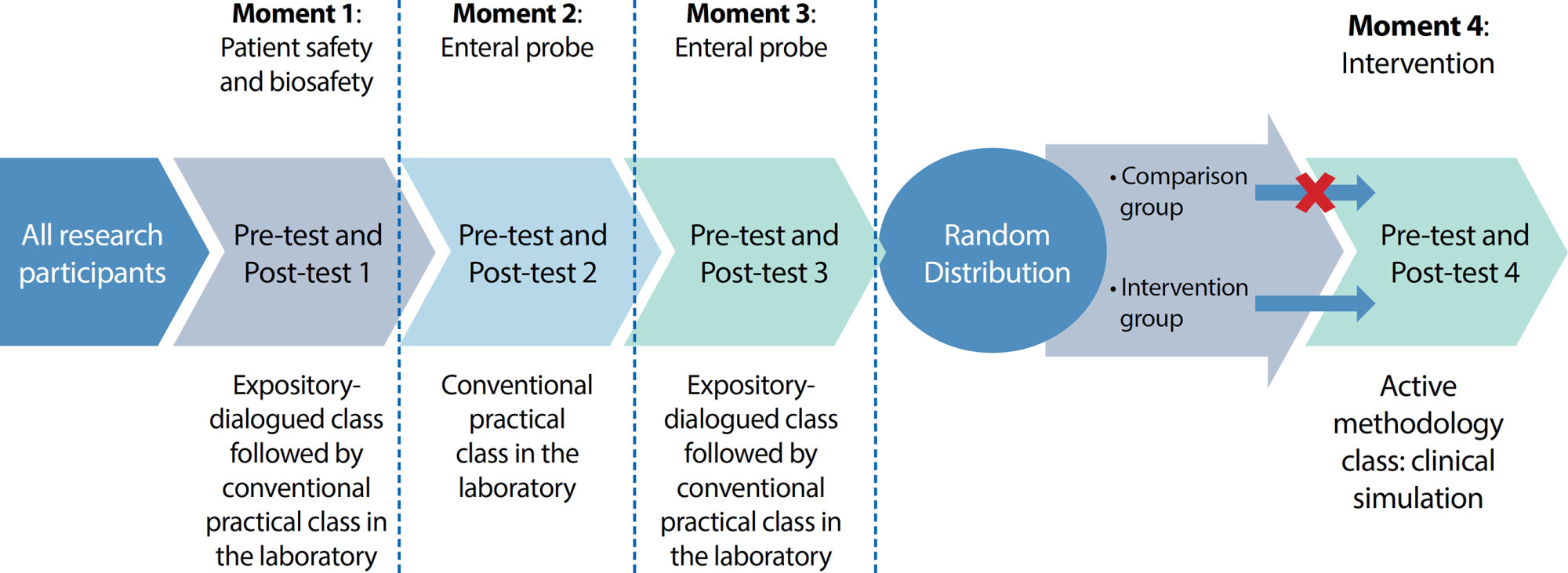
-
ORIGINAL ARTICLE08-10-2020
Eliot Freidson’s sociology of professions: an interpretation for Health and Nursing
Revista Brasileira de Enfermagem. 2020;73(6):e20180950
Abstract
ORIGINAL ARTICLEEliot Freidson’s sociology of professions: an interpretation for Health and Nursing
Revista Brasileira de Enfermagem. 2020;73(6):e20180950
DOI 10.1590/0034-7167-2018-0950
Views0See moreABSTRACT
Objectives:
to analyze theoretical conceptions of Eliot Freidson’s Sociology of Professions scoped on health and nursing professions.
Methods:
Eight nurses were interviewed, all involved in the development of the professional Council on the timeframe from 1975 to 1986. Documental resources were Laws, Ordinances, Resolutions, Reports, Meeting Minutes and Public Deeds. Information was organized as from literature and Eliot Freidson’s conceptions, and thematic content analysis was carried out.
Results:
the concepts authored by Eliot Freidson allowed for the development of a concept chart that portrays the nursing profession and that may be expanded for the other occupations in the health field, in consonance with professional organization in the country.
Final Considerations:
Eliot Freidson’s framework, in interpretation for nursing, consolidates the profession with relative autonomy, expertise by Nursing Care Systematization and credentialism by professional normalizations.
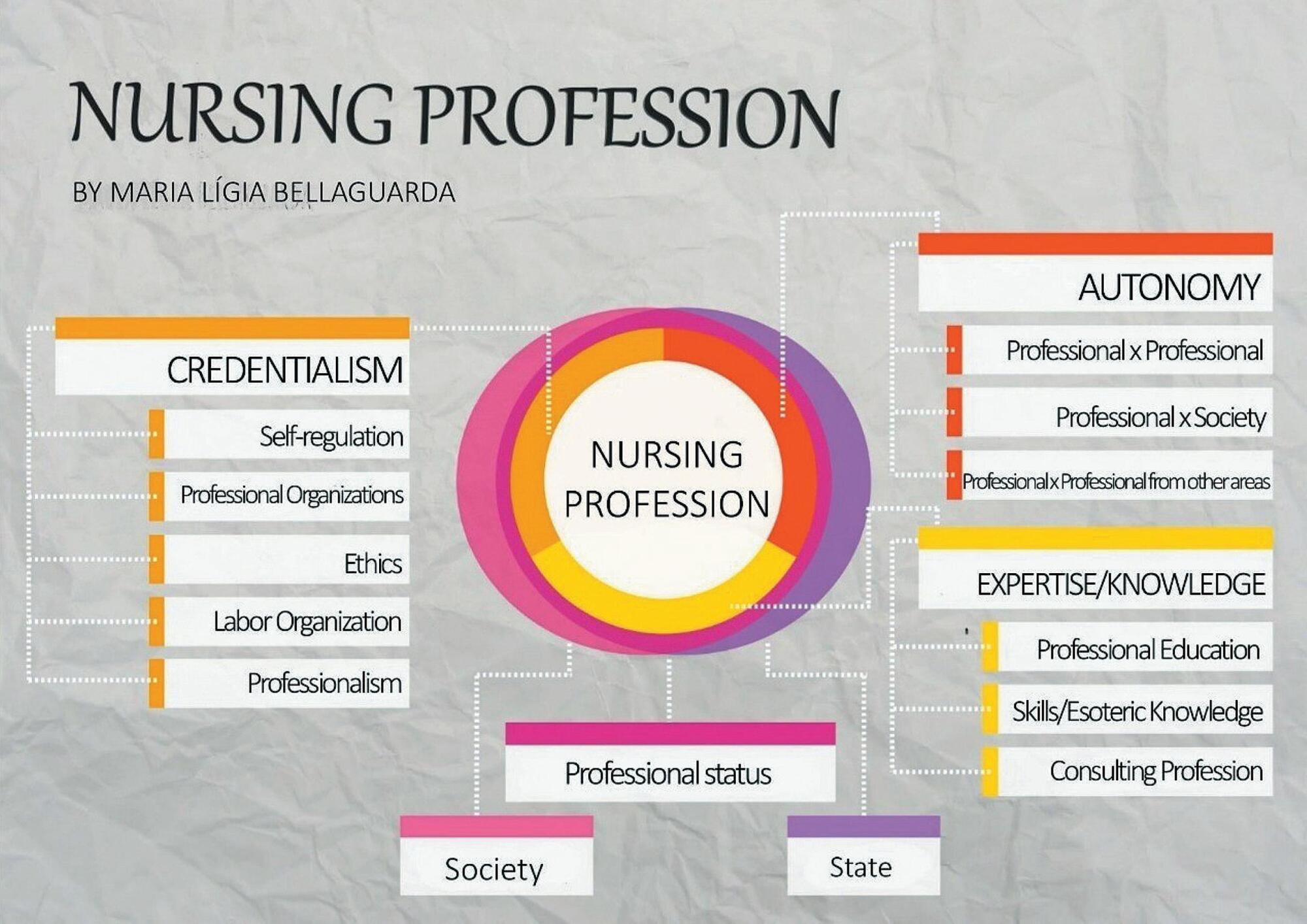
Search
Search in:
Nuvem de Tags
Adolescente (85) Atenção Primária à Saúde (239) COVID-19 (91) Criança (91) Cuidados de Enfermagem (269) Educação em Enfermagem (151) Educação em Saúde (139) Enfermagem (930) Enfermagem Pediátrica (86) Estudantes de Enfermagem (77) Estudos de Validação (131) Família (87) Idoso (208) Promoção da Saúde (99) Qualidade de Vida (104) Saúde do Trabalhador (86) Saúde Mental (145) Saúde Pública (82) Segurança do Paciente (150) Tecnologia Educacional (100)



